Jane Austen excelled at writing engaging novels, relatable heroines, and swoon-worthy heroes.
She wrote leading men ranging from incredible to subpar, and if you're wanting to know who falls where on the scale, I've got you covered.
Edmund Bertram ("Mansfield Park").
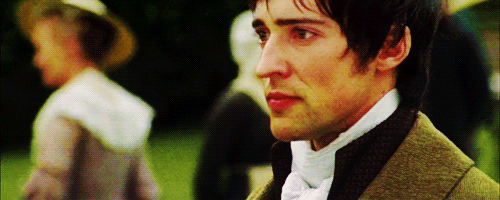
Literally the worst romance of all time for the worst novel.
Edmund spends the entirety of the novel pining for someone else, and then is suddenly in love with Fanny—and we only get an epilogue-esque explanation of this instead of being able to witness any hint at his feelings like the other heroes. All we know is that as Fanny comforts him and helps him get over Mary Crawford, he realizes his feelings for her.
He's a good guy, I guess. He wants to be a clergyman despite everyone telling him he could go into something else and make more money, so it's cool that he sticks to what he believes is right or whatever (though clergy are still gentry so he's still in the upper class, even with that profession). But his love for Fanny—or lack thereof—is entirely unimpressive. While Charles Bingley and Edward Ferrars are unfortunately rather weak heroes, Edmund Bertram is more like Frank Churchill in the sense that his biggest flaw is his selfishness.
I still stand by the fact that the better story would've been Henry Crawford's redemption and him being Fanny's love interest, and you can 1000% fight me on that. Jane Austen did us all dirty with this one.
Frank Churchill ("Emma").

This guy suuuuucks.
He openly flirted with Emma Woodhouse in front of his fiancée, Jane Fairfax, and lied to everyone about their relationship so his controlling, near-death aunt wouldn't find out and hold on for life just to thwart his romance. He also only came to visit his father because Jane would be there. The dude hadn't seen his dad for years and plans to visit kept falling through, but somehow when Jane is in Hartfield, he magically is able to visit.
His feelings for Jane are extreme, as is fitting for his age and temperament. It causes him to do stupid things, like buying her an extravagant and impractical gift, moodily fighting, and trying to make her jealous. He does love her, and in his last scene with Emma, he spends nearly the entirety of it admiring and praising Jane, lauding her as an angel and his superior in every way.
Still, he's a bit of a butt.
Edward Ferrars ("Sense & Sensibility").
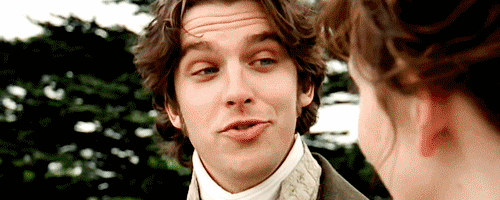
Edward got close to Elinor Dashwood because he loved her and couldn't help himself. Unbeknownst to the heroine, he was engaged to another woman. He was drawn in by Elinor and started to fall for her, but when he realized what was going on, he distanced himself and tried to do what was right. He purposefully didn't visit the family so as to not lead her on.
In the end, he was willing to do the right thing even when it came to sacrificing his own happiness. Being engaged to Lucy Steele would've cost him his inheritance and standing in his family, and even though he didn't love her anymore, he stood by his promise to her. Luckily for him, Lucy was a gold digger and dropped him as soon as she found out she wouldn't see his money, freeing him up for Elinor.
He really loved Elinor and was all shy and cute about it, but he was almost kind of spineless… Overall a good guy, just not the ideal Austenian hero.
Charles Bingley ("Pride & Prejudice").

AKA the human embodiment of a golden retriever.
Charles is sweet, likeable, generous, and the perfect match for Jane Bennet. He loves Jane, but under persuasion from Darcy and his terrible sisters, is convinced is affections aren't returned—and he is surely better off for it. He goes away to London, but when he returns to Netherfield Park, his affections for Jane are revived. He proposes to her and is eagerly accepted.
His biggest weakness is being so influenced by other people instead of having and sticking by his own decision and opinions. Besides that, though, he's a catch.
Colonel Brandon ("Sense & Sensibility").

My initial reaction to Colonel Brandon and Marianne's love story is still a bit hard to shake. I'm possibly a bit too much like Marianne and had a view similar to hers in the first half of the novel. Colonel Brandon's a good man, but ultimately old and not quite interesting.
I know, I know: I'm a monster for saying such a thing. But my perspective has been shifting.
He's an incredibly good man. He took on the daughter of his dead love (who ended up marrying someone other than him) as his ward and looked after her, and when Willoughby took advantage of and impregnated her, Colonel Brandon dueled the young scoundrel for her honor. It showed that he was a well-rounded, three-dimensional character outside of simply being Marianne's love interest.
He had feelings for Marianne, but when it was clear that she wasn't interested, he pines from a distance and never makes her feel uncomfortable. If anything, he gets irritated when Mrs. Jennings makes comments about his relationship with Marianne in front of the latter. He even goes out of his way and does what wasn't exactly considered socially appropriate to warn the Dashwoods of Willoughby's true nature so as to protect Marianne.
Henry Tilney ("Northanger Abbey").

Often overlooked, Henry Tilney is possibly Jane Austen's wittiest and most charming hero. While those attributes normally belong to the scoundrels of her novels (Wickham, Willoughby, and even Frank Churchill), they are given a good name in Henry.
He constantly teases Catherine Moreland's taste in novels and how easily she allows her imagination to run wild. He dances with her and is endearing and a good friend, the exact opposite of what she finds in John Thorpe.
At first his father approves of a potential relationship with Catherine because he's wrongly assumed she comes from a rich, affluential family. When he finds out he was wrong, he kicks Catherine out. Henry doesn't stand for this, berates his father, and proposes to Catherine despite his father's disapproval.
Though Austen admits that Henry only began to seriously consider Catherine because he could already perceive her affections for him, something that back then was considered "dreadfully derogatory of an heroine's dignity," she assures readers that he "was now sincerely attached to her" and "felt and delighted in all the excellencies of her character and truly loved her society."
Captain Frederick Wentworth ("Persuasion").
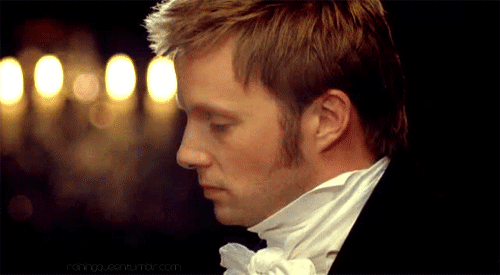
Bless him, Captain Wentworth was one of Jane Austen's most petty heroes. For most of the novel, he's blinded by bitterness. He's still angry with Anne Elliot for listening to others' advice instead of her love for him and ending things between them over eight years prior to the start of the novel. In an act of angry pride, he flirts with Louisa Musgrove in front of Anne.
But he can't help his feelings. He's still in love with Anne, and his jealousy of her and her cousin, Mr. Elliot, causes him to react, leaving the opera and telling Anne there was "nothing worth staying for."
While such a reaction is more obnoxious and rude than romantic, you have to admire Captain Wentworth for being Jane Austen's most emotional hero instead of bordering on stoic like the others.
Eventually he gets his act together. His declaration of love shows he's humbled and knows his place; he doesn't deserve Anne after everything, but he's entreating her to love him:
"You pierce my soul. I am half agony, half hope. Tell me not that I am too late, that such precious feelings are gone for ever. I offer myself to you again with a heart even more your own, than when you almost broke it eights years and a half ago."
Fitzwilliam Darcy ("Pride & Prejudice").
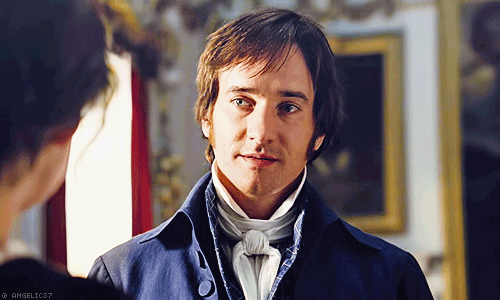
Ah, Darcy. The most well-known hero Jane Austen has ever written. His love story with Elizabeth Bennet is the stuff of dreams: he starts off as a rich, entitled, rude boy who falls in love with Elizabeth and, after plenty of mistakes and failings, becomes a better man.
One of the best thing about their love story is that it's not some stupid "this woman makes the jerk a good guy, so ladies, pls keep dating the turds in hopes you can reform them." Both of them are flawed, and the novel is a story of equals undergoing mutual growth of character.
Darcy rectifies his mistakes, makes sure Wickham marries Elizabeth's sister so that their family's reputation isn't ruined, and professes his love for Elizabeth without assuming she'll be eternally grateful for his love.
Honestly, the only reason he's not number 1 is because Darcy is pretty much the only Austenian hero we ever hear about and I want the other good ones to be recognized, too.
George Knightley ("Emma").
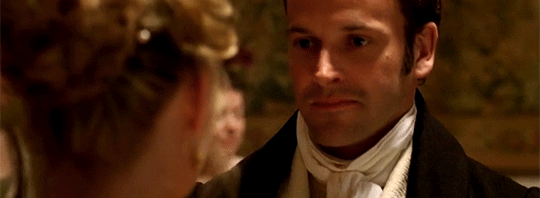
The beeeeeeeest.
He's like Darcy but not awkward. He's reserved, logical, and cares about what's socially appropriate. But instead of looking down on members of the lower class who are a bit obnoxious, Knightley has compassion on them. He cares about people, going so far as to rebuke Emma for not having the same compassion on those in a class beneath her and teasing Mrs. Bates.
While he could use his position as the wealthiest in Hartfield and throw around his weight, lording it over everyone, he does the opposite. He looks after them, advising, respecting, and defending a young farmer, Mr. Martin. He has superiority of character.
He's known Emma since she was a baby, and they have always had an amusing back-and-forth. He lectures her, and she puts up with it, sometimes listening to him (though he is most often right than not, as she learns over the course of the novel), but he doesn't view himself as the reason why she's become a good person. He attributes it to her own innate goodness and the influence of Miss Taylor, but not him. His declaration of love is home to one of the greatest lines: "If I loved you less, I might be able to talk about it more."
He's a cutie, through and through. (And Jonny Lee Miller's portrayal in the BBC "Emma" miniseries only serves to further endear audiences to the character.)
Obviously, not everyone will agree with this ranking. My own sisters don't and prefer certain heroes to others, but that's kind of the point. We're all allowed to have our own interpretations of the characters Jane Austen gave us.



















